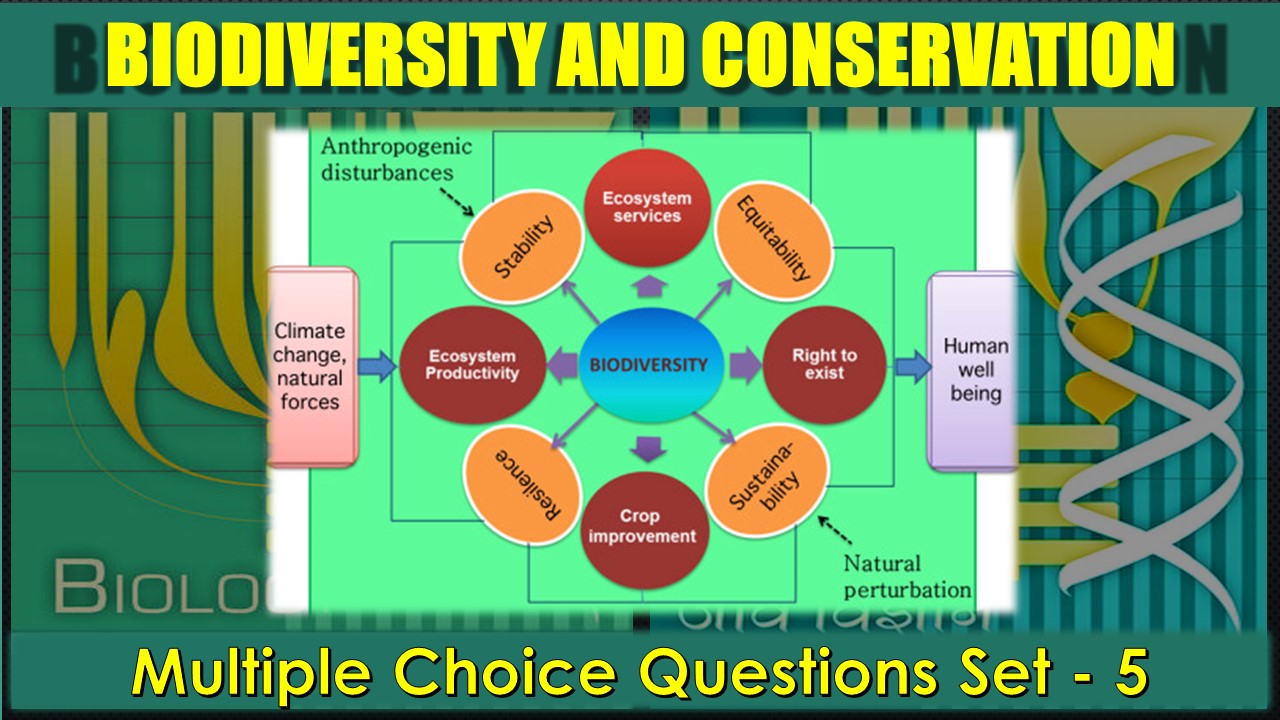CBSE Class 12 Biodiversity and Conservation Multiple Choice Questions with Answers. MCQ Questions Class 12 Biodiversity and Conservation with Answers Is Prepared Based on Latest Exam Pattern. Students can solve NCERT MCQ questions Class 12 Biodiversity and Conservation with Answers to know their preparation level.
Students who are searching for NCERT MCQ Questions Class 12 Biodiversity and Conservation with Answers are compiled here to get good practice on all fundamentals. Know your preparation level on MCQ Questions for Class 12 Biodiversity and Conservation with Answers. You can also verify your answers from the provided MCQ Class 12 Biodiversity and Conservation with Answers. So, ace up your preparation with MCQ of Class 12 Biology Examinations.
MCQ Questions Class 12 Biodiversity and Conservation with Answers - Set - 5
Question 1:
A tree species in Mauritus failed to reproduce because of the extinction of a fruit-eating bird. Which one of the following was that bird?
(a) Dove
(b) Dodo
(c) Condor
(d) Skua
Correct Answer – (B)
Question 2:
Alexander von Humboldt described for the first time
(a) laws of limiting factor
(b) species area relationships
(c) population growth equation
(d) ecological biodiversity.
Correct Answer – (B)
Question 3:
What is common to the following plants: Nepenthes, Psilotum, Rauwolfia and Aconitum?
a) All are prone to over exploitation
b) All are phylogenic link species
c) All are ornamental plants
d) All are exclusively present in the Eastern Himalayas
Correct Answer – (A)
Question 4:
Renewable source of energy is
(a) biomass
(b) coal
(c) petroleum
(d) kerosene
Correct Answer – (A)
Question 5:
Which one of the following is not used for ex-situ plant conservation?
(a) Shifting cultivation
(b) Botanical gardens
(c) Field gene banks
(d) Seed banks
Correct Answer – (A)
MCQ Questions Class 12 Biodiversity and Conservation With Answers
Question 6:
Select the correct statement about biodiversity.
(a) The desert areas of Rajasthan and Gujarat have a very high level of desert animal species as well as numerous rare animals.
(b) Large scale planting of Bt cotton has no adverse effect on biodiversity.
(c) Western ghats have a very high degree of species richness and endemism.
(d) Conservation of biodiversity is just a fad pursued by the developed countries.
Correct Answer – (C)
Question 7:
In your opinion, which is the most effective way to conserve the plant diversity of an area?
(a) By tissue culture method
(b) By creating biosphere reserve
(c) By creating botanical garden
(d) By developing seed bank
Correct Answer – (B)
Question 8:
Which part of the world has a high density of organism?
(a) Deciduous forests
(b) Grasslands
(c) Tropical rain forests
(d) Savannahs
Correct Answer – (C)
Question 9:
Occurrence of endemic species in South America and Australia is due to
(a) these species has been extinct from other regions
(b) continental separation
(c) there is no terrestrial route to these places
(d) retrogressive evolution
Correct Answer – (B)
Question 10:
From origin of life to its diversification on earth, there have occurred following number of episodes of mass extinction.
(a) Two
(b) Three
(c) Four
(d) Five
Correct Answer – (D)
- NCERT Solutions Class 11 Chemistry Chapter 1 : Some Basic Concepts of Chemistry
- NCERT Solutions Class 11 Chemistry Chapter 2 : Structure Of The Atom
- NCERT Solutions Class 11 Chemistry Chapter 3 : Classification of Elements and Periodicity in Properties
- NCERT Solutions Class 11 Chemistry Chapter 4 : Chemical Bonding and Molecular Structure
- NCERT Solutions Class 11 Chemistry Chapter 5 : States of Matter
- NCERT Solutions Class 11 Chemistry Chapter 6 : Thermodynamics
- NCERT Solutions Class 11 Chemistry Chapter 7 : Equilibrium
- NCERT Solutions Class 11 Chemistry Chapter 8 : Redox Reactions
- NCERT Solutions Class 11 Chemistry Chapter 9 : Hydrogen
- NCERT Solutions Class 11 Chemistry Chapter 10 : The s-Block Elements
- NCERT Solutions Class 11 Chemistry Chapter 11 : The p-Block Elements
- NCERT Solutions Class 11 Chemistry Chapter 12 : Organic Chemistry: Some Basic Principles and Techniques
- NCERT Solutions Class 11 Chemistry Chapter 13 : Hydrocarbons
- NCERT Solutions Class 11 Chemistry Chapter 14 : Environmental Chemistry




